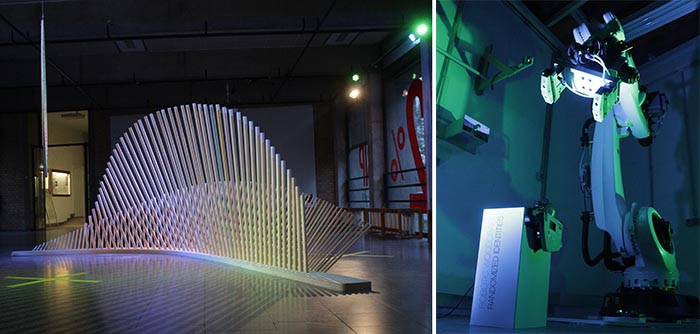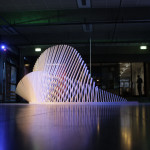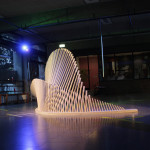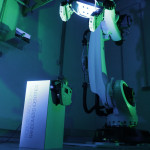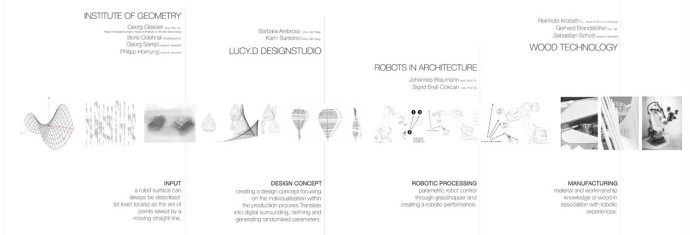Randomized Identities
supported by Schunk-Intec GmbH
VIENNA DESIGN WEEK
25.9.-4.10.
University for Applied Arts Vienna
DOWNLOAD PRESS INFORMATION (ENGLISH)
DOWNLOAD PRESS INFORMATION (GERMAN)
The interdisciplinary research team of Robotic Woodcraft consists of researchers and designers of the University of Applied Arts, the Association for Robots in Architecture and the Vienna based designstudio Lucy.D. RANDOMIZED IDENTITIES focuses on the idea of individualization within a production process, rather than a replication of the original prototype. The designers of the Lucy.D developed a digital, generative process that generates an infinite range of surfaces. Taking into account the specifications of parameters like height, diameter, amount and spacing, these digitally generated patterns and the associated process information orchestrate and actuate computer controlled woodworking tools; at the same time seamlessly creating and materializing three dimensional surfaces. The flexibility of present-day robotic machinery allows for a continuous implementation of modifications.
Instead of using industrial robots with the purpose of replacing human labor, we create a digital ecosystem that introduces random factors into machines that are otherwise accurate to the tenths of a millimeter. We show industrial robots as the strong and intuitive tools that they are and open up new areas of wood geometry and human – machine-cooperation beyond industrial file to factory concepts. The RANDOMIZED IDENTITIES‘ peculiarity lies not only in their aesthetic qualities, but in them inherently reflecting the capabilities of contemporary production facilities and conditions. In this sense, they stand for a new form of integrated product and process development and all-together for a new way of thinking design.
PRESENTATION AND LIVE ROBOTIC PERFORMANCE
University of Applied Arts Vienna
Auditorium (Aula) and Workshop of Institute for Wood Technology (basement)
1, Oskar Kokoschka Platz 2
www.dieangewandte.at
www.roboticwoodcraft.com
25.09., 28.09.-2.10.
// LIVE ROBOTIC in the Workshop of the Institute for Wood Technology (basement)
daily (except weekend) from 18:00-20:00h
// PRESENTATION in the entrance hall of the University of Applied Arts
daily (except weekend) from 09:00-20:00h
Cocktail: Di 29.09., 18:00-22:00h
// LIVE-VISUALS by Bildwerk onto the wooden structures of RANDOMIZED IDENTITIES in the auditorium (Aula) // LIVE-ROBOTIC in the Workshop of the Institute for Wood Technology (basement)
ABOUT ROBOTIC WOODCRAFT (PEEK ARTS-BASED RESEARCH)
Robotic Woodcraft is a transdisciplinary, arts-based investigation into robotic arms at the University for Applied Arts Vienna. Bringing together the craftsmen of the Department for Wood Technology, the geometers of the Department for Arts and Technology, the industrial design office Lucy.D and the roboticists of the Association for Robots in Architecture, this research project explores new approaches on how to couple high-tech robotic arms with high-end wood fabrication.
Through the PEEK program for arts-based research, the Robotic Woodcraft project acquired a KUKA QUANTEC KR120R2500 robot and set it up at the Department for Wood Technology. Most commonly seen in the automotive industry, this particular robot can lift 120 kg and reach up to 2.5 m in all directions. What makes it especially interesting for the research project is that robotic arms are highly multifunctional machines, turning from a milling machine into a 3D-printer simply by changing the tool – similar to manual processes. www.roboticwoodcraft.com
ABOUT THE TEAM OF ROBOTIC WOODCRAFT
/// INSTITUTE OF GEOMETRY (UNIVERSITY OF APPLIED ARTS)
The department of geometry is headed by Prof. Dr. Georg Glaeser. It offers various lectures for students of different curricula. Modern technologies are used to present new and old results in from geometric research. The research group pays its attention especially to the applications of geometry in many areas. The relations of the more theoretical knowledge to fine arts, technology, nature are worked out where ever they appear. The huge amount of publications, books, presentations at conferences and workshops demonstrate how active this department is. Research Assistants Georg Sample and Philip Hornung. www.dieangewandte.at
/// LUCY.D
Barbara Ambrosz and Karin Santorso established the Viennese design studio Lucy.D in 2003. Their various products can be found in the fields of product, architecture as well as corporate design. Within their designs concepts form, function and technical aspects coincide in an intelligent way. They are constantly looking to find and create harmony and balance between tradition and innovation, sense and sensuality, detail and ensemble. Their clients include Alessi, J. & L. Lobmeyr, Wiesner-Hager and the hotel chain Wombats. Tèo, the teaspoon for Alessi is honored with the Menzione d’onore Compasso d’Oro in 2014 and Liquid Skin, the drinking bowl for Lobmeyr is part of the collection at the Museum of Modern Art in NY and their new cakes design line for Landtmann‘s feine Patisserie has been honored with the Wallpaper Design Award 2015. www.lucyd.com
/// ROBOTS IN ARCHITECTURE
The Association for Robots in Architecture was founded by Sigrid Brell-Cokcan and Johannes Braumann with the goal of making robots accessible to the creative industry. RiA pursues this goal on the one hand by creating a network of robot users and hosting Rob|Arch, a conference series on robotic fabrication in architecture, art, and design. On the other hand, it acts as a research institution, participating in research projects such as Robotic Woodcraft (FWF) and AROSU (EU).
KUKA|prc (parametric robot control) is an accessible software tool that was developed by RiA to allow architects and designers to control industrial robots through visual programming. Today, the software is not only being used in the creative industry, but in a wide variety of industrial fields.
Sigrid Brell-Cokcan now heads the Chair for Individualized Production at RWTH Aachen, while Johannes Braumann is visiting professor at the University for Arts and Design Linz. www.robotsinarchitecture.org
/// WOOD TECHNOLOGY (UNIVERSITY OF APPLIED ARTS)
The department for Wood Technology is headed by Reinhold Krobath and staffed by professional master joiners. Students from every area of study receive theoretical and practical teaching in wood technology. In addition to basic lectures, seminars and exercises form focal points, which encourage students to experiment in line with their study courses. During individual, artistic-technical teaching students are provided with an opportunity to implement their project, semester or diploma projects in a professional manner. All processes from the idea to realization are furthered in the areas of furniture, prototype construction, modelling and art. The project Robotic Wood Craft benefits from the knowledge and experience of this departments, as well as the department now benefits from the robot which offers new possibilities. www.dienagewandte.at

